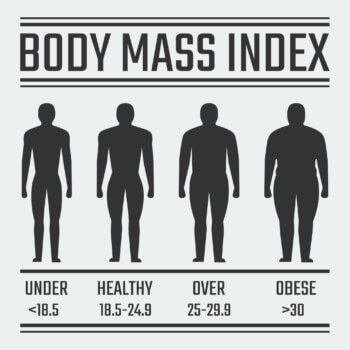According to the Center for Disease Control (CDC), more than one-third, or 78.6 million, adult Americans are obese. In children ages 2-19, obesity already affects 12.7 million. In 2008, the annual medical cost of obesity was $147 billion, with obese individuals having as much as $1,429 more in medical bills than those with a healthy weight.
But these are just numbers. The real problem is the health risks associated with obesity. The obesity epidemic is leading to disease epidemics and mortality statistics that can’t be seen anywhere else in the world except the United States.
What Defines Obesity?
From a numbers standpoint, obesity screening starts with a person’s Body Mass Index. BMI is calculated using your weight and height, and ranges have been established to determine underweight, healthy weight, overweight, and obese persons.
You can use this calculator to determine your BMI then consult the chart below to see where you fall on the weight range. However, it’s important to note that BMI is a screening tool and not a diagnosis. Your doctor will consider several other factors including diet, exercise, lifestyle, genetics, and overall health to determine whether your weight is healthy or unhealthy.
Body Mass Index Chart
<18.5 = underweight
18.5 to 24.9 = normal or healthy weight
25 to 29.9 = overweight
>30 = obese
Health Risks Of Obesity
Individuals who are obese are at a greater risk for many health conditions and serious disease, including some of the leading causes of death in the US: heart disease, cancer, stroke, and diabetes.
- High blood pressure (Hypertension)
- High LDL cholesterol, low HDL cholesterol, or high levels of triglycerides (Dyslipidemia)
- Type 2 diabetes
- Coronary heart disease
- Stroke
- Gallbladder disease
- Osteoarthritis
- Sleep apnea and breathing problems
- Certain cancers (endometrial, breast, colon, kidney, gallbladder, and liver)
- Poor quality of life
- Depression and anxiety
- Body pain and poor physical performance
Causes Of Obesity
While many people think diet and inactivity alone cause obesity, there are many other factors that can contribute to it. Some are controllable, and some are not. This is why a medical evaluation is important to help rule out hidden factors such as genetics, medication, environmental factors and subconscious behaviors.
Treatment For Obesity
For many people, creating an energy balance between calories consumed and calories burned is the first step toward treating obesity. This means being cognizant of the food you eat, minimizing processed foods, sugar and unhealthy fats; and eating plenty of fruits, vegetables and whole, unprocessed foods. Keeping a food journal or using a tracking app like My Fitness Pal is a helpful way to visually see the impact of your diet. When you add exercise, you can track that as well and the app will apply your calories burned against your calories consumed. When you achieve a calorie deficit, you will begin slowly losing weight.
Depending on your health, physical abilities and additional factors that your doctor has determined could be causing your obesity, he or she may suggest a more aggressive treatment plan that includes weight loss supplements, personal training, and a nutritionist. Your doctor may also suggest changing or eliminating certain medications and seeing a behavioral therapist to help you overcome any mental roadblocks standing in the way of a healthier you.
Raintree Medical & Chiropractic Center Offers Weight Management Programs
If you’re ready to take control of your weight, Raintree Medical & Chiropractic Center offers weight management and nutritional counseling programs. We will perform a complete medical evaluation and create a weight loss plan that includes diet, exercise and supplements as needed, and we will continually monitor your progress within a positive, supportive environment.
Call 816-623-3020 or request an appointment online for your initial consultation.

